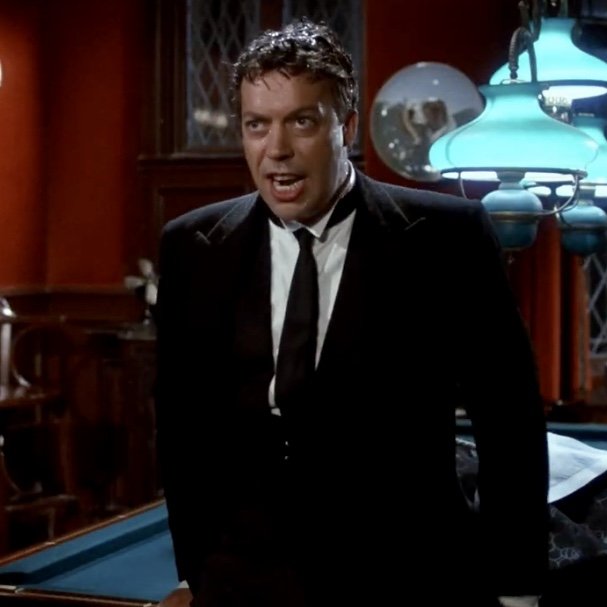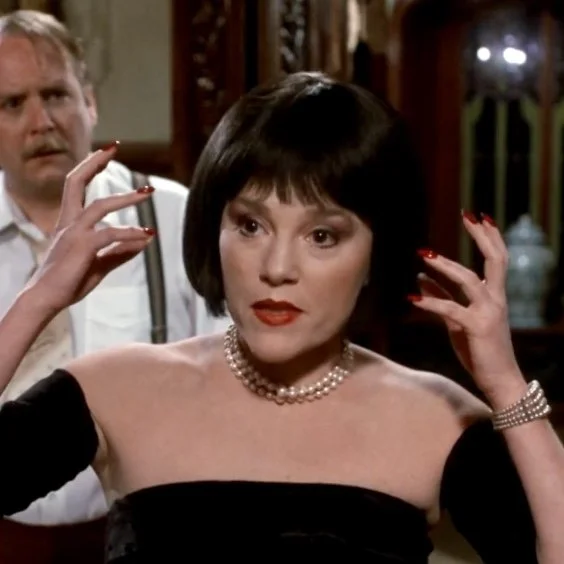Life After Death: The Cult Classic That is Clue
It boggles the mind to think that the 1985 comedic murder mystery, Clue flatlined upon its initial theatrical release. Opening on December 13, 1985, the film, co-conceived by John Landis, and based on the classic Parker Brothers’ board game, was up against The Jewel of the Nile, the sequel to the successful adventure-comedy, Romancing the Stone, with Rocky IV and Landis’ Spies Like Us also continuing to do well commercially. One thing I don’t understand (one thing?): Why Clue didn’t get an October or Halloween-season release-date, considering its murder-mystery genre.
However, with the help of cable television, and the birth of the VHS rental market, Clue was brought back to life by viewers, in their living rooms, with the remote control. From John Morris’ Hitchcockian, Bernard Herrmann-inspired orchestral score during its opening credits, to the solid cast of “colorful” characters that the viewer meets one by one as each arrives at a spooky manor on a dark and stormy night, Clue is “cozy murder” at its best.
The screenplay’s mid-1950’s timeframe allowed the director and screenwriter, Jonathan Lynn, to weave in satirical jabs at McCarthyism, conservative moral codes, even good ol’ fashioned capitalism. But mostly, Clue works because of the sharp lines of dialogue, quickly delivered between characters. Tim Curry’s Wadsworth, the Butler, not only tidies up the kitchen and the dining room, but takes it upon himself (as a workingman’s Hercule Poirot) to neatly wrap up the mystery via a zany, fast-paced, cartoon-caliber reenactment of the evening’s events, where the viewer discovers the whodunit and two other who(could’ve)dunits.
Repeated airings and rentals in the ‘80s and ‘90s, and purchases, of Clue have earned the film a large fan base, to the point where it’s easily reached cult-classic status. In particular, Madeline Kahn’s improvised “flames” monologue is a fan favorite, and probably the movie’s most recited section.
Long story short (too late): Clue certainly proves that just because something doesn’t break box-office records doesn’t mean it’s destined for the bargain bin and into obscurity; with a strong ensemble cast, a witty script full of memorable lines, and the support of a deeply loyal following, a film such as Clue can take on a life (after death) of its own.
Coppola Mechanism: Francis and Sofia’s Different Portrayals of Loneliness
In between The Godfather and The Godfather Part II, Francis Ford Coppola directed another classic: 1974’s The Conversation. Gene Hackman plays Harry Caul, a San Francisco surveillance expert who delves relentlessly into other people’s lives. Yet after one assignment, which has him initially (just) eavesdropping on a wealthy man’s wife and her male companion, he eventually finds himself trying to save what’s left of his own life. The viewer, funnily enough in an inherently voyeuristic role, sees that it’s not much of a life to begin with (barren loft void of color or personality; awkward attempts at human relations, specifically ones with women). Yet Harry seemingly resounds himself to reclusiveness, a sort of Catholic-induced self-punishment for the guilt that goes along with doing what he knows is wrong.
Coppola’s still-relevant script touches upon themes of technological obsession, voyeurism and paranoia, and its last scene is solemn and unsettling. Slow-jazz saxophone plays over the scene, a disturbingly serene choice to show someone peacefully succumbing to the (literal) mess one has made of his life. While Harry keeps human interaction and emotional involvement at a literal faraway distance, there’s a character in another Coppola creation who wants to intentionally connect with others, but first, with herself.
Partly based on Sofia Coppola’s time in Tokyo during her early twenties, 2003’s Lost in Translation is one of the best at capturing loneliness. The scene when Charlotte (Scarlett Johansson) calls a friend on the phone—a symbol of communication and connection—illustrates yet another way Charlotte feels dismissed and disconnected, not just a stranger in a new city, but worse, in her own life. As she sits alone in her hotel room, high atop and removed from the hustle and bustle of the city below, tearful gasps represent, in more ways than one, a longing to find home. The film’s soundtrack of dreamy, melancholic melodies and fuzzy feedback create a sense of… wander, and at times convey a hopeful reawakening for Charlotte, and actor in mid midlife crises, Bob (Bill Murray), both looking to feel refreshed after spending their lives in a (jet lag) haze.
Although both films are almost 30 years apart, Francis and Sofia show characters who are achingly lonely, yet the main difference is that one feels he deserves to be, the others are desperately trying not to be.
The Conversation: Paramount Pictures; Lost In Translation: Focus Features.
Neil Simon: The Write Stuff
The playwright and screenwriter, Neil Simon passed away today at the age of 91. Known for his smart, sharp tone, two (of the many) films easily considered required viewing: 1976’s Murder By Death; 1978’s California Suite.
Murder by Death is an homage to classic murder-mystery novels, features characters inspired by famous fictional detectives, gathered together at a creepy manor for dinner and a “lovely murder…” The cast is a collection of greats (David Niven; Alec Guinness; Maggie Smith, as high-society Dora Charleston; basically everyone in the movie). Here, Dick (played by Niven) and Dora arrive, greeted by a blind butler (Guinness). Simon’s witty writing is evident, and at times could be subtle, yet not any less hilarious. The fast-paced delivery only makes the lines even better, with Smith owning a fabulously deadpan punchline:
California Suite features four different stories that take place at a posh Los Angeles hotel. One of which serves as comedic commentary on Hollywood and awards shows, as Maggie Smith (yes, the same Smith) plays Diana Barrie, an English actress nominated for a Best Supporting Actress award, in town for the ceremony. (Smith actually won the Academy Award for Best Supporting Actress for this role.) Every line Smith utters is gold, and the dialogue with Michael Caine is again fast-paced, like watching expert tennis players volley shots over a net. (Also of note: Jane Fonda’s Hannah, a bitter New Yorker visiting her happy-in-California ex-husband to discuss custody arrangements.) But here, Smith’s drunk Barrie returns to her hotel room after a long, disappointing night:
Gene Wilder: His Comedic Timing Was No Charade
The comedic actor, Gene Wilder passed away recently. Mel Brooks’ Young Frankenstein, starring, and co-written, by Wilder, wonderfully captured the actor’s distinctive talent. The film served as homage to the black-and-white horror movies of days gone by, particularly, and obviously, Frankenstein. Brooks’ take featured Wilder as Dr. Frankenstein (it’s pronounced Frahn-ken-steen, as noted in one of the many hilarious scenes), who sets out to re-animate the dead, with the help of Igor (it’s pronounced Eye Gore, played by Marty Feldman) and Inga, an attractive laboratory assistant played charmingly by Teri Garr. Peter Boyle plays The Creature; Cloris Leachman, the creepy castle caretaker; the brilliant Madeline Kahn, Dr. Frankenstein’s self-absorbed fiancé. Wilder had a knack for displaying comedic calm (“I will NOT… be… angry.”), followed almost instantaneously by frantic absurdity (“… 54-inch-wide go-rilla!”). Wilder will also be remembered for playing eccentric chocolate-factory owner, Willy Wonka; a cowboy past his prime in Blazing Saddles, another Brooks classic; his work with the comedian, Richard Pryor, and many other projects, yet it’s Young Frankenstein that displays his signature style.
Another genius gone: Madeline Kahn. Her character portrayal and delivery are close to comedic perfection:






